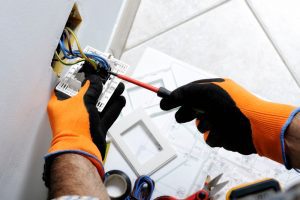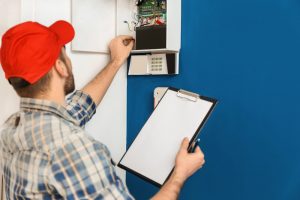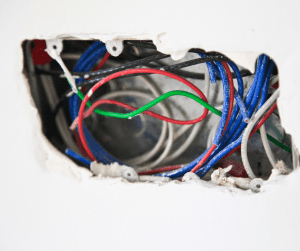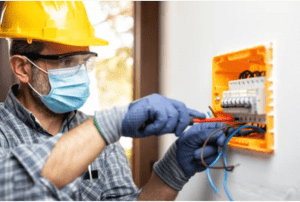How a Residential Electrician in Woodstock GA, Can Diagnose and Resolve Issues With Electrical Troubleshooting?
Welcome to our comprehensive guide on electrical troubleshooting! In this article, we will explore the important role of a residential electrician in diagnosing and fixing various electrical issues that can arise in your home. Electrical problems can be both frustrating and potentially dangerous, so it’s crucial to have a skilled professional who can effectively identify and resolve these issues.
Whether you’re experiencing flickering lights, faulty outlets, or frequent circuit breaker trips, a residential electrician possesses the expertise to diagnose the problem accurately and implement the necessary repairs. So, let’s dive in and discover the techniques and strategies employed by these skilled professionals to ensure your electrical systems are functioning optimally.
Understanding Electrical Troubleshooting
Electrical troubleshooting is the process of identifying and resolving electrical problems in residential settings. These issues can range from minor faults to more complex electrical failures. Proper troubleshooting involves a systematic approach to diagnose the root cause of the problem and implement the necessary repairs or replacements.
The Role of a Residential Electrician
A residential electrician plays a crucial role in electrical troubleshooting. Their expertise and experience enable them to identify and rectify electrical issues efficiently. Here are some key responsibilities of a residential electrician during the troubleshooting process:
1. Assessing the Situation
Upon arrival at your property, a residential electrician will assess the situation and gather information about the electrical problem you are experiencing. They will ask you specific questions to understand the symptoms and any recent changes that may have occurred in your electrical system.
2. Conducting a Thorough Inspection
Next, the electrician will conduct a comprehensive inspection of your electrical system. They will examine the wiring, electrical panels, outlets, switches, and other components to identify any visible signs of damage, wear, or improper installations.
3. Utilizing Testing Equipment
To accurately diagnose the problem, a residential electrician will utilize various testing equipment and tools. These include voltage testers, multimeters, circuit analyzers, and thermal imaging cameras. These tools help in detecting abnormalities, voltage fluctuations, short circuits, and other electrical irregularities.
4. Identifying the Root Cause
Based on their findings, the electrician will identify the root cause of the electrical issue. This step requires in-depth knowledge and expertise to interpret the test results and pinpoint the exact problem area. Identifying the root cause is crucial as it determines the appropriate course of action for repairs.
5. Implementing Effective Solutions
Once the residential electrician identifies the underlying problem, they will propose a suitable solution to resolve it. This may involve repairing or replacing damaged components, rewiring circuits, or upgrading outdated systems. A professional electrician will ensure that the solution complies with safety standards and local electrical codes.
6. Ensuring Safety and Compliance
Safety is a top priority in electrical troubleshooting. A competent residential electrician will follow safety protocols and take necessary precautions to protect themselves and your property during the troubleshooting and repair process. Additionally, they will ensure that all repairs and installations comply with electrical codes and regulations.
Benefits of Hiring a Professional Residential Electrician

Now that we understand the role of a residential electrician in troubleshooting electrical issues, let’s explore the benefits of hiring a professional for these tasks:
1. Expertise and Experience
Professional residential electricians possess the expertise and experience necessary to handle a wide range of electrical problems. Their in-depth knowledge of electrical systems allows them to quickly diagnose and fix issues efficiently. This saves you time and ensures the problem is resolved correctly the first time.
2. Safety Assurance
Working with electricity can be dangerous, especially for those without the proper training and equipment. Professional electricians undergo extensive safety training and are equipped with the necessary tools to handle electrical troubleshooting safely. By hiring a residential electrician, you can ensure the safety of your home and loved ones.
3. Reliable and Long-lasting Repairs
DIY electrical repairs can often lead to temporary fixes or even exacerbate the problem. Professional electricians provide reliable and long-lasting repairs by addressing the root cause of the issue. They use quality materials and follow industry best practices, ensuring that the repaired system functions optimally for years to come.
4. Time and Cost Efficiency
While it may be tempting to attempt DIY repairs to save money, it can lead to costly mistakes in the long run. Hiring a residential electrician can save you both time and money. They have the necessary tools and expertise to complete the troubleshooting and repairs efficiently, minimizing downtime and reducing the risk of further damage.
5. Peace of Mind
By entrusting your electrical troubleshooting to a professional, you gain peace of mind knowing that the problem will be handled with precision and care. Professional electricians stand behind their work and provide warranties, ensuring that you are satisfied with the results and have recourse if any issues arise in the future.
Common Electrical Issues in Residential Settings

Before we delve into the diagnostic procedures used by residential electricians, let’s explore some of the most common electrical issues encountered in homes. Understanding these problems can help you identify potential issues and know when it’s time to call in a professional. Here are a few examples:
- Flickering Lights: Flickering lights can indicate a variety of problems, including loose wiring, damaged fixtures, or issues with the electrical panel. An electrician will assess the situation to determine the root cause and provide the appropriate solution.
- Tripped Circuit Breakers: Circuit breakers are designed to protect your electrical system from overloading. If you frequently experience tripped breakers, it could be due to excessive power consumption or faulty wiring.
- Electrical Surges: Surges can damage sensitive electronic devices and appliances. A residential electrician can install surge protectors to safeguard your equipment and troubleshoot the source of the surges.
- Faulty Outlets: Non-functioning outlets can be frustrating and inconvenient. A professional electrician will examine the outlet, identify the underlying issue, and either repair or replace it.
- Overloaded Circuits: Overloading circuits can lead to overheating and potential fire hazards. An electrician can assess the load on your circuits and redistribute it to prevent overloads.
Now that we have a better understanding of common electrical issues, let’s explore how a residential electrician approaches troubleshooting and resolving these problems.
Diagnostic Techniques Used by Residential Electricians

Electrical troubleshooting requires a systematic approach to identify and resolve issues effectively. Here are the diagnostic techniques employed by residential electricians:
1. Visual Inspection and Testing
The initial step in electrical troubleshooting is a visual inspection of the affected areas. Electricians carefully examine wiring, outlets, switches, and circuit breakers to identify any visible signs of damage, loose connections, or wear and tear. Additionally, they use specialized tools to perform various tests, such as voltage testing, continuity testing, and resistance testing.
2. Circuit Tracing and Mapping
When faced with complex electrical problems, electricians employ circuit tracing and mapping techniques to track the flow of electricity throughout your home’s electrical system. By understanding the circuit layout, they can identify potential areas of concern and locate the source of the problem more efficiently.
3. Load Testing
Load testing involves measuring the electrical load on a circuit to determine if it exceeds the maximum capacity. Electricians use load testing to identify potential overloads and make necessary adjustments to prevent electrical failures and hazards.
4. Fault Isolation
Fault isolation is a critical step in troubleshooting electrical issues. Electricians employ various methods to isolate faults, such as using multimeters, infrared cameras, and insulation resistance testers. These tools enable them to pinpoint the exact location of the problem, whether it’s a short circuit, ground fault, or other electrical anomalies.
5. Electrical Panel Inspection
The electrical panel is the heart of your home’s electrical system. Residential electricians thoroughly inspect the panel to ensure it is functioning correctly and meets safety standards. They check for loose connections, damaged components, and signs of overheating. If any issues are detected, they can repair or upgrade the panel accordingly.
6. Collaboration and Troubleshooting Expertise
Experienced residential electricians often collaborate with their peers to tackle complex electrical issues. They share insights, exchange ideas, and leverage their collective expertise to solve intricate problems. This collaborative approach allows them to provide the best possible solutions for homeowners.
Frequently Asked Questions (FAQs)
Q: How can I determine if I need to call a residential electrician for my electrical problems?
- A: If you’re experiencing persistent electrical issues, such as frequent power surges, tripped breakers, or malfunctioning outlets, it’s advisable to contact a residential electrician. They have the expertise to diagnose and resolve complex electrical problems safely.
Q: Is it safe to attempt electrical troubleshooting on my own?
- A: Electrical troubleshooting requires specialized knowledge and skills to ensure safety. It’s recommended to leave electrical repairs and troubleshooting to trained professionals who understand the potential hazards and know how to mitigate them.
Q: How much does it cost to hire a residential electrician for troubleshooting?
- A: The cost of hiring a residential electrician varies depending on the complexity of the issue, geographical location, and the electrician’s experience. It’s best to contact multiple electricians for quotes to get an accurate estimate.
Q: Are residential electricians licensed and insured?
- A: Yes, reputable residential electricians are licensed and insured. Licensing ensures that they have met the necessary requirements and possess the knowledge and skills to perform electrical work safely. Insurance provides liability coverage in case of accidents or damage during the job.
Q: How frequently should I have my electrical system inspected by a residential electrician?
- A: It’s generally recommended to have your electrical system inspected by a residential electrician every few years, or more frequently if you’re experiencing issues. Regular inspections can help identify potential problems early on and ensure the safety and efficiency of your electrical system.
Conclusion
Electrical troubleshooting is a complex task that requires the expertise of a residential electrician. By employing various diagnostic techniques, these professionals can identify and resolve electrical issues, ensuring the safety and efficiency of your home’s electrical system. Whether you’re dealing with flickering lights, faulty outlets, or overloaded circuits, a skilled electrician can provide effective solutions, giving you peace of mind.
To ensure you don’t get overcharged every month, be sure to hire an residential electrician in Woodstock, GA to find, diagnose, and fix the problem as soon as possible. This not only lowers your energy bills, but also protects you from accidents and electrical injuries that are common in homes.
As you can see, different types of electrical problems can occur in your home. That’s why you should always have a trusted “electrician near me” on your speed dial list so you can call them anytime if you have any problem. electrical problem. When it comes to electrical work, safety is of the utmost importance and one can never be too careful.




